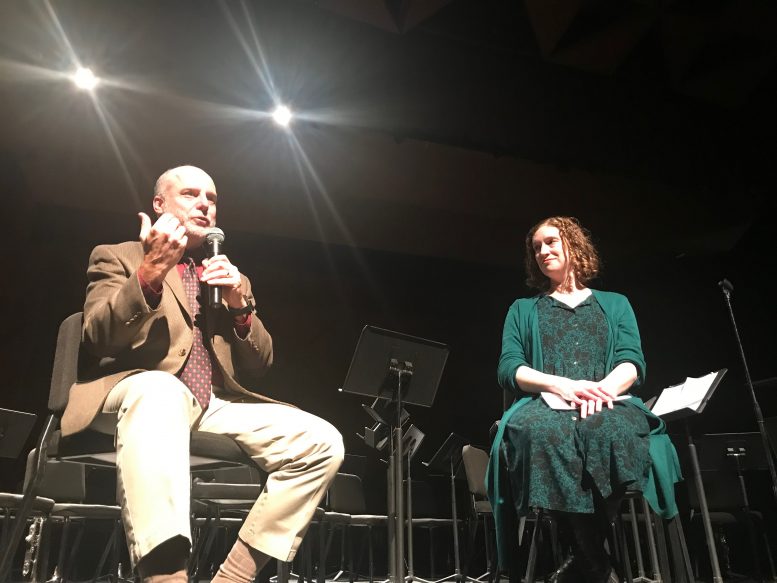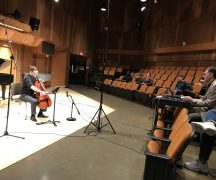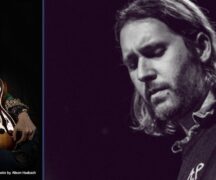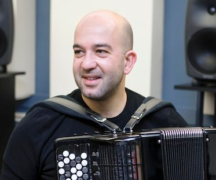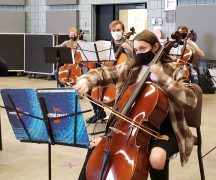- By DAVID DUPONT
BG Independent News
Last Valentine’s Day, the Douglas Stoneman High School Wind Symphony was rehearsing Vaclav Nelhybel’s “Symphonic Movement” when the killing started.
A gunman had entered the ninth grade building across from the band room and was shooting.
The code red lockdown was in place. The band students put away their instruments, left the music on their stands, and guided by the SWAT team left the building.
Before that moment, what the band had on its mind was performing that piece in just a few weeks in Carnegie Hall during the New York Wind Band Festival.
Now an expelled student had returned to the Parkland, Florida school and killed 17 staff and students, including two involved in the band program.
The music stopped, but not for long.
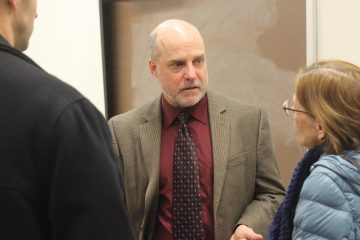
Alex Kaminsky talks about school security with Doug Mead and Kathi Henry, of the Toledo School for the Arts
Alex Kaminsky, the band director at Douglas Stoneman High, visited Bowling Green State University Thursday to talk about his experience in the aftermath of the tragedy and to hear the premier performance of a composition written in response to the attack. In the afternoon, he spoke with the students in Lisa Martin’s Band Methods class.
Bruce Moss, the director of band activities, arranged the visit. He called Kaminsky one of the best high school band directors in the country. While most directors would be happy to be asked to perform at the prestigious Midwest Clinic once, Kaminsky will be bringing the Stoneman Douglas Band there for his fourth appearance, an engagement secured before the shooting. Moss noted Kaminsky has taken bands from three different schools to the clinic.
On Thursday Kaminsky told the class of future band directors that the day after the shooting, his pastor told him: “‘None of us understand this. … You are here for such a time as this.’”
That statement weighed on Kaminsky. “I realized at that moment that everything I did or would do would affect the trajectory of the students with whom I had been entrusted. … My role in their lives has been heightened to a level I’d never had to experience in the past.”
Among the victims were two ninth graders Alex Schachter, 14, a trombonist, and Gina Montalto, 14, a member of the color guard.
Kaminsky’s son, Ethan, also a ninth grader, was not in the building where the shooting occurred. A trumpet player, he was the only freshman in the elite Wind Symphony. So he was with his father. That helped Kaminsky focus on all the students.
The band director decided after the memorial service that he needed to bring the band members and families together. So they arranged to gather at their usual off-campus hangout.
As he and his wife were getting ready to leave for the meeting, Ethan was blowing his horn. Nothing special, a few jazz licks, his father recalled. His parents had to wait to leave until he was done. Kaminsky looked at his wife, and for the first time in two days, they smiled. Ethan, he realized, needed to play.
His thoughts turning to the rest of the band, he said, “I have to figure out how to get these kids to play.”
The high school was shuttered, but he arranged with the principal and police to allow parents, no students allowed, to enter the band room for 30 minutes to retrieve music and instruments.
Then he scheduled rehearsals in the middle school for all three of his concert bands, starting with the Wind Symphony.
Kaminsky wondered what the band should play on this momentous first rehearsal after the tragedy.
He thought of “Southern Hymn” by his friend Sam Hazo. So he contacted the composer and asked for the parts. The piece is not as difficult as what the Wind Symphony usually performs.
The mood in the band room was somber. “It’s really tough,” he told the musicians. “We’re just going to read this and dedicate it to those who were lost.”
When they finished, it was quiet. “I felt they were able to release some tension.” They moved on to the music they were preparing for Carnegie Hall even though at that point Kaminsky was “pretty much certain we’d cancel the trip.”
But the way the students reacted to the music convinced him otherwise. “There’s something different about how they’re playing. I was looking at their eyes. They need to express what’s inside right now.”
Their experience in the last few days could not be excised. That trauma was part of them, part of how they expressed themselves in music.
Kaminsky consulted with parents — always talk to the parents, he advised the future band directors.
Then he talked to the student leadership of the bands. They all agreed they should travel to New York.
They would perform in honor of those who had died “and as a statement that we will continue to make music regardless of what happened.”
Kaminsky said: “The band program has become an arena for the students and myself and the parents and everyone else to go forward.”
Ever the band director, Kaminsky was concerned about the two weeks of rehearsal the band lost. The young musicians were not as prepared as he would have liked.
Still, he said: “The music making that came out of those kids was unbelievable. Every thing we played had a profundity that it’d never had before.”
After their performance in Carnegie Hall during the day, the Wind Symphony was asked to return for the final concert that featured collegiate bands.
They were to reprise their performance of the finale of Mahler’s Third Symphony to conclude the concert.
Kaminsky will not play that piece again, he told the concert audience Thursday night. He was asked to include it on the program at the Midwest Clinic.
But for the Stoneman Douglas Wind Symphony, he said, the Mahler piece belongs in that moment in Carnegie Hall when there wasn’t a dry eye in the house.
The same was true of “Until Morning Come” by Andrew Boss, another piece composed in reaction to the tragedy, that the Stoneman Douglas band performed.
“Certain pieces become sacred,” he said during the after-concert public conversation with BGSU musicologist Katherine Meizel, who has produced a CD of music created by young people in response to the tragedy.
The power of music was on display Thursday night when the Concert Band performed Andrew David Perkins’ “Until the Night Collapses,” which is dedicated to the students, parents, and staff of Stoneman Douglas High School. Kaminsky’s band will perform the piece later this year.
Before the performance, Perkins said: “This piece was born out of my dismay that mass shootings are a regular occurrence, where active shooter drills are necessary in my daughter’s pre-school classroom, and our government is largely unwilling to take proactive measures to keep these tragedies from happening. I’ve also been inspired by the Stoneman Douglas students and their willingness to deeply engage with and seek solutions to this very real problem we have.”
The piece begins with an explosion of percussion. Perkins said he quoted the melodies of patriotic songs including a dissonant rendering of a phrase from the National Anthem to express “the darkness we have in our country.” The composer also employed the melody of the U2 song “Sunday, Bloody, Sunday.” The lyrics to that tune ask the question: “How long must we sing this song?”
Perkins said he still believes the country can overcome the violence that plagues it.
Kaminsky said that it has been the students who have shown the most resilience. “They just want safer schools.” The adults get caught up with “too many peripheral things.”
Music is a powerful tool, he said. Whether it’s a tragedy or a happy occasion, music unifies people.
Listening to music is therapeutic, playing it more so, and performing music at a high level is all the more so. Concentrating in that way blocks out other concerns.
That seems true for one freshman bassoonist. During the attack, a bullet whizzed by her ear and hit and killed her bandmate Alex Schachter.
She didn’t want to return to school. But Kaminsky encouraged her parents to have her get out her bassoon and come to rehearsal. She’s now back in school, and coping, and making music.
“Our reply to violence,” Kaminsky said, “is to create beautiful music.”

